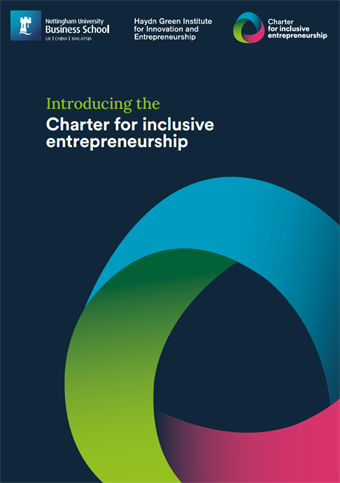
Charter for inclusive entrepreneurship
The Charter for inclusive entrepreneurship aims to facilitate a more inclusive enterprise ecosystem in the UK. It has been developed by Nottingham University Business School’s Dr Lorna Treanor and Helen Burkinshaw, Policy Officer for The Women’s Organisation.
Entrepreneurship is vital for innovation, job creation, and economic growth.
It can also support social inclusion by offering individuals opportunities to create employment for themselves and within their community whilst also contributing social and environmental innovation and impact.
Under-represented social groups, such as women, ethnic minorities, young people, migrants and people experiencing disabilities, face distinctive barriers to entrepreneurship.
Through specifically designed and delivered policy initiatives, inclusive practices, and collective endeavour, inclusive entrepreneurship aims to minimise barriers to and enhance outcomes from entrepreneurship for all, especially under-represented groups.
Why do we need a Charter?
The current enterprise ecosystem in the UK does not provide sufficient, fair and productive access to entrepreneurship for all, especially for under-represented groups such as women and ethnic minorities.
Facilitating participation in entrepreneurship for these underrepresented social groups can boost the overall economy, create substantial new business, and add significantly to employment and income opportunities.
The Charter for inclusive entrepreneurship is a clear commitment toward the development of an inclusive ecosystem that would support anyone wishing to start a successful and sustainable business, regardless of their personal characteristics or background.
Principles
The Charter outlines the core principles for implementing and supporting an inclusive entrepreneurship ecosystem in the UK across five key areas:
- Promoting diverse role models across the enterprise ecosystem
- Delivering inclusive enterprise support
- Enabling lifelong learning of entrepreneurship education
- Ensuring equal access to enterprise finance
- Implementing measurable targets for inclusive enterprise policy and procurement practices
Commitment
Signatories to the Charter will:
- commit to implementing the principles of the Charter
- visibly display their commitment to the Charter by displaying the Charter mark on their websites and promotional material where relevant
- actively promote the Charter within their own supply chain and encourage suppliers and/or clients to adopt the principles of the Charter, where appropriate
- recruit diverse workforces to ensure diversity across gender, ethnicity, age and ability/disability among their workforce and/or procured service providers where appropriate
- ensure staff are aware of gender, race, disability and other potential barriers to service uptake and that such considerations are factored into service delivery, design, promotion and practical arrangements
- ensure staff undertake appropriate equality, diversity and inclusion training in line with good practice
 Co-authors Lorna Treanor and Helen Burkinshaw
Co-authors Lorna Treanor and Helen Burkinshaw




